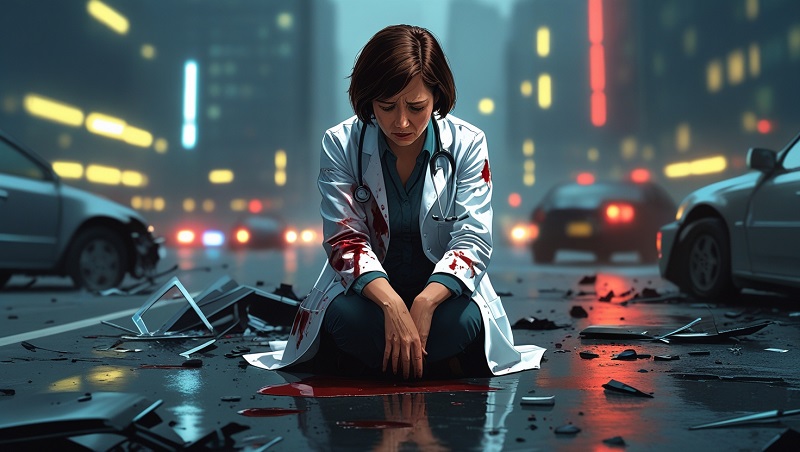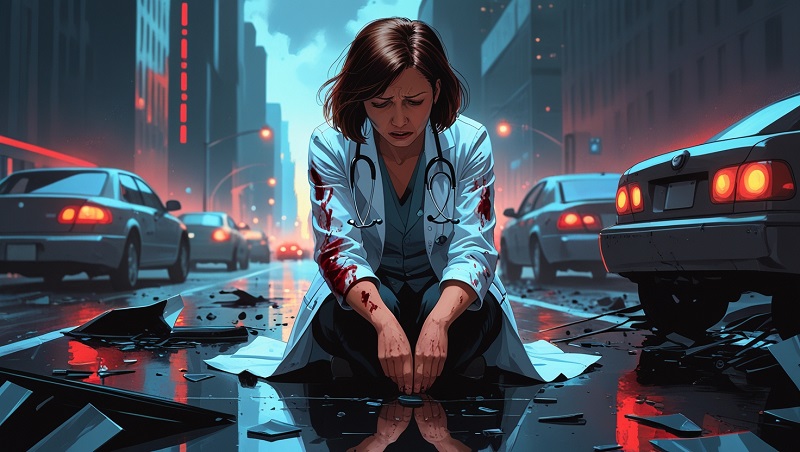Car accidents, even minor ones, can have a profound impact on the body. While broken bones and external injuries are often obvious and immediately treated, internal injuries particularly those involving the brain and nervous system may not manifest right away. This is where the role of a neurologist becomes critical. A neurologist is a medical specialist trained to diagnose and treat conditions that affect the nervous system, including the brain, spinal cord, and peripheral nerves. After a car accident, seeing a neurologist can be a life-saving decision. This article will explore why consulting a neurologist after an accident is essential, what symptoms to watch for, what the neurologist will do, and how this visit can impact your recovery and legal case.

Understanding the Role of a Neurologist
A neurologist is a physician who specializes in treating disorders of the nervous system. This includes conditions affecting the brain, spinal cord, and nerves throughout the body. Unlike general practitioners, neurologists undergo extensive training to understand complex neurological disorders. When it comes to car accidents, a neurologist is vital for identifying injuries such as concussions, traumatic brain injuries (TBI), nerve compression, whiplash-related issues, or spinal cord damage.
These types of injuries are not always visible on an X-ray and may require more specialized diagnostic tools like MRIs, CT scans, and EEGs. A neurologist’s expertise allows them to assess subtle but dangerous issues that can become debilitating or even fatal if untreated. More importantly, neurological injuries can present delayed symptoms—sometimes taking days or even weeks to fully manifest—making the need for specialized evaluation even more urgent.
Common Neurological Injuries from Car Accidents
The force of a car accident can cause various types of trauma to the nervous system. These injuries are often categorized based on the area affected:
1. Traumatic Brain Injuries (TBI)
TBIs are among the most serious and potentially life-altering consequences of a car crash. They occur when a sudden jolt or blow to the head disrupts normal brain function. TBIs range from mild concussions to severe injuries that lead to permanent brain damage. Symptoms may include confusion, dizziness, headaches, memory loss, nausea, and in some cases, loss of consciousness.
2. Concussions
A concussion is a type of mild TBI. While it might not show up on imaging tests, its symptoms can persist for weeks or longer. Repeated concussions can lead to cumulative brain damage, so even a single concussion should be taken seriously.
3. Spinal Cord Injuries
Injuries to the spine can lead to partial or complete paralysis depending on the severity and location of the damage. Even a slipped disc pressing on a nerve can cause extreme pain, loss of function, and mobility issues. Symptoms often include tingling, numbness, and weakness in the limbs.
4. Whiplash-Associated Disorders
Whiplash, caused by the sudden backward and forward movement of the neck, may not only affect muscles and ligaments but also damage the nerves. This is particularly common in rear-end collisions. Neurological symptoms include tingling, numbness, or burning sensations in the arms and hands.
5. Peripheral Nerve Injuries
These occur when nerves outside the brain and spinal cord are compressed or stretched during impact. For example, the brachial plexus (nerve network in the shoulders and arms) is particularly vulnerable in accidents.
Symptoms That Warrant a Visit to a Neurologist
Following a car accident, it’s common to focus on visible injuries. However, neurological symptoms, even if subtle, should not be ignored. If you experience any of the following, you should consider seeing a neurologist:
- Persistent or worsening headaches
- Dizziness or balance issues
- Confusion or difficulty concentrating
- Numbness or tingling in limbs
- Weakness in arms or legs
- Blurred vision or light sensitivity
- Seizures
- Difficulty speaking or understanding language
- Sleep disturbances or chronic fatigue
- Memory problems
These symptoms may be immediate or appear days or weeks after the incident. Many people make the mistake of attributing them to stress or general fatigue, thereby delaying critical medical intervention.
The Diagnostic Process: What to Expect
A neurologist will start by conducting a comprehensive neurological exam. This includes evaluating your motor functions, reflexes, coordination, muscle strength, and sensory perception. Depending on your symptoms and history, the following diagnostic tools might be used:
- MRI (Magnetic Resonance Imaging): Used to detect brain and spinal cord abnormalities, such as bleeding, swelling, or tumors.
- CT Scan (Computed Tomography): Helpful in quickly identifying fractures or hemorrhages.
- EEG (Electroencephalogram): Measures electrical activity in the brain to detect seizures or irregular brain function.
- EMG (Electromyography): Evaluates muscle response to nerve stimulation to detect nerve damage.
These tests help in forming a complete picture of the injury’s impact, enabling the neurologist to craft a suitable treatment plan.
Treatment Options Provided by a Neurologist
After identifying the specific neurological issue, the neurologist may suggest a variety of treatments based on severity and location. Treatment options include:
- Medications: For pain management, inflammation, seizures, or mood disorders associated with TBI.
- Physical Therapy: Helps regain mobility and strength, especially for patients with spinal cord or nerve injuries.
- Cognitive Therapy: Crucial for those suffering from memory loss, speech problems, or other cognitive impairments.
- Injections or Nerve Blocks: Used in managing chronic pain or nerve inflammation.
- Surgical Referrals: In severe cases, neurologists may refer patients to neurosurgeons for corrective operations.
- Rehabilitation Programs: For long-term care and recovery, particularly for spinal cord injury patients.
Timely treatment from a neurologist can significantly improve the chances of full recovery and prevent chronic complications.

The Importance of Early Intervention
The sooner you consult a neurologist after a car accident, the better your outcome. Many neurological conditions are progressive, meaning that the longer they go untreated, the more severe they become. For instance, a minor concussion left unmonitored can lead to post-concussion syndrome, which can cause prolonged cognitive impairment.
Early intervention also improves the effectiveness of rehabilitation therapies. In cases of nerve damage or paralysis, prompt treatment can make the difference between regaining function and living with permanent disability.
Impact on Legal and Insurance Claims
Medical documentation from a neurologist can play a crucial role in legal and insurance proceedings. If you intend to pursue compensation for your injuries, having detailed medical records from a specialist adds credibility to your case. Insurance companies are more likely to take claims seriously when there’s verified neurological evaluation backing them.
In legal proceedings, a neurologist can serve as a medical expert to validate the extent of your injuries. This can influence the settlement you receive for pain and suffering, loss of income, and future medical care. Without neurological assessment, many hidden injuries might go unrecognized, reducing the overall value of your claim.
Choosing the Right Neurologist
Selecting an experienced neurologist with a background in post-trauma care is vital. Look for specialists who have dealt with car accident cases and are familiar with symptoms of TBI, whiplash, and nerve injuries. Consider neurologists affiliated with rehabilitation centers or hospitals, as they often have access to a wider range of diagnostic tools and therapies.
You can ask your primary care physician, orthopedic doctor, or lawyer for recommendations. Many personal injury law firms also work closely with neurologists experienced in medico-legal documentation.
Long-Term Monitoring and Recovery
Neurological injuries often require long-term care and monitoring. Follow-up appointments help ensure the injury is healing properly and that no new symptoms are developing. Patients who have suffered traumatic brain injuries may need cognitive testing over time to evaluate memory, reasoning, and decision-making skills.
Sometimes, chronic symptoms such as migraines, neuropathy, or movement disorders can develop months later. Consistent monitoring by a neurologist helps in adjusting the treatment plan and ensuring optimal quality of life.
Emotional and Psychological Considerations
Neurological damage is not just physical. Many patients experience psychological effects following a car accident, especially when brain injury or chronic nerve pain is involved. Depression, anxiety, mood swings, and PTSD are common in these patients.
While a neurologist can prescribe medication or therapy for some of these conditions, they often work in coordination with psychiatrists or psychologists to offer holistic care. A multi-disciplinary approach that includes mental health treatment is essential for complete recovery.
Case Example: Real-Life Scenario
Consider the story of Jessica, a 32-year-old teacher who was rear-ended at a stoplight. Initially, she only reported neck pain and declined further medical evaluation after an ER visit. A week later, she began experiencing blurry vision, migraines, and difficulty concentrating. It wasn’t until her third-week post-accident that she saw a neurologist, who diagnosed her with post-concussion syndrome.
Had Jessica seen a neurologist earlier, she could have started treatment sooner and prevented many of her symptoms from worsening. Her neurologist’s detailed report also helped her win a substantial personal injury settlement that covered her therapy, lost wages, and long-term care.
Preventing Future Issues
The body’s ability to mask symptoms right after trauma is powerful, often fueled by adrenaline and shock. However, this can also hide neurological injuries. Always err on the side of caution. If you’ve been in a car accident, even if you feel fine, consider scheduling a consultation with a neurologist especially if you hit your head or experience any neurological symptoms.
Keep track of all symptoms in a journal, including changes in mood, memory lapses, or physical coordination issues. This helps your neurologist track patterns and catch conditions early.
Conclusion
Car accidents can leave lasting scars not all of which are visible. Seeing a neurologist after a car crash is a crucial step in ensuring comprehensive care. From diagnosing brain injuries to managing nerve damage, neurologists play a pivotal role in helping patients recover physically and emotionally. Even if you feel fine, the delayed onset of neurological symptoms means it’s always better to be proactive. Getting evaluated by a neurologist can not only safeguard your health but also strengthen your legal claim and secure the compensation you deserve. Don’t wait for symptoms to worsen take control of your recovery journey with expert neurological care.
FAQs
1. When should I see a neurologist after a car accident?
Ideally, within the first few days if any neurological symptoms appear such as headaches, dizziness, or numbness.
2. Can a neurologist help with whiplash?
Yes, especially if there are nerve-related symptoms like tingling or burning sensations.
3. Will insurance cover my neurologist visit?
If it’s part of a personal injury claim, auto or health insurance may cover it. Consult with your insurer or attorney.
4. Can a neurologist testify in court for my case?
Yes, neurologists often serve as expert witnesses in personal injury cases.
5. What tests will a neurologist do?
Common tests include MRI, CT scan, EEG, and EMG, depending on symptoms.


